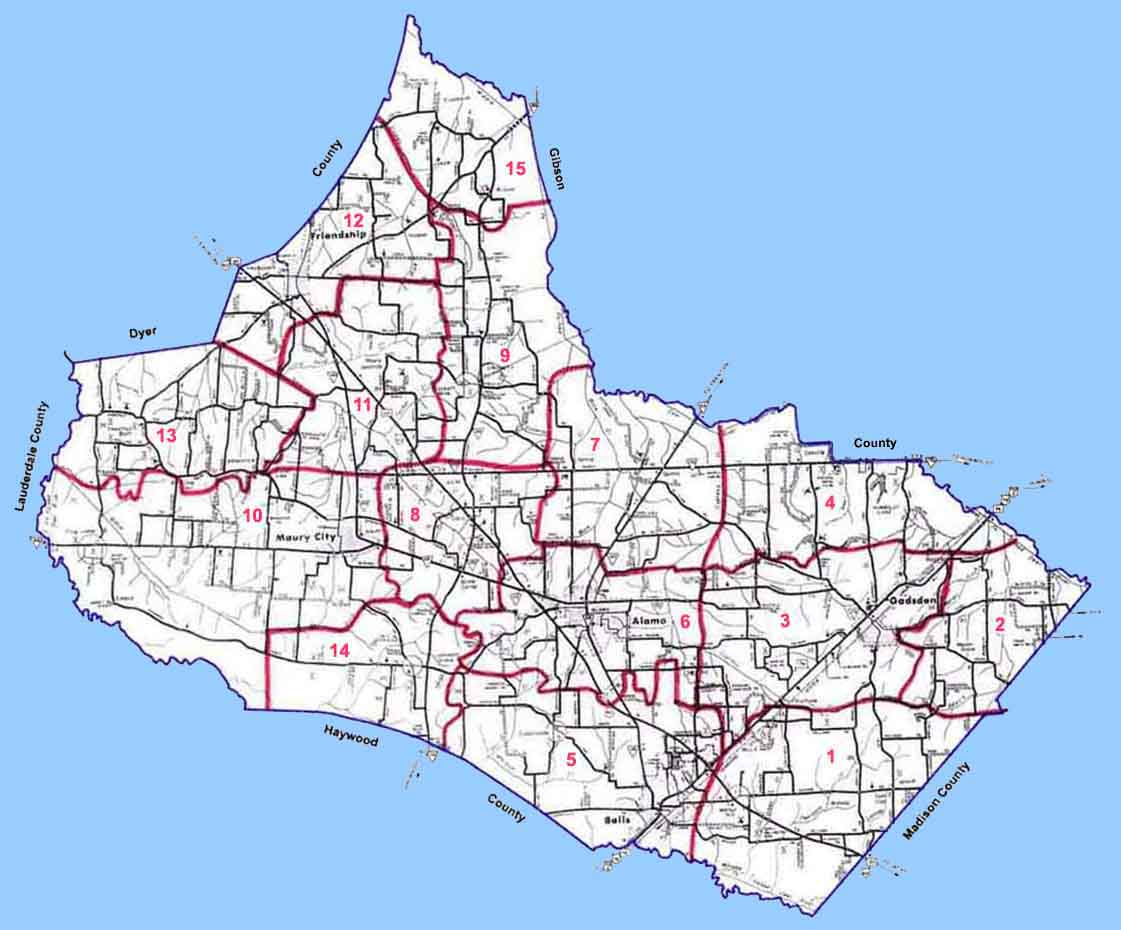The following is from The Goodspeed History of Tennessee, Crockett County, published by the Goodspeed Publishing Co., 1887.
Alamo, the county seat, is situated near the center of the county, in a healthy locality, six miles northwest from Bellís Depot, the nearest station on the railroad, and 160 miles southwest from Nashville on a air line, and has a population of about 300. The town lies in the Sixth Civil District, which was formerly a part of Haywood County, and was founded in 1846 by Isaac M. Johnson, who named it Cageville, in honor of his mercantile partner, Lycurgus Cage. The name was changed to that of Alamo in 1872, upon the organization of the county, the act creating Crockett County specifying that the county seat should bear that name. Messrs. Johnson & Cage were the first men to do business in the town, they engaging in general merchandising in 1847. The following year a post-office was established, and Mr. Johnson appointed postmaster. The only other merchants of Alamo from 1847 to 1850 were Johnson & McFarland and John B. Johnson, and from 1850 to 1860 Isaac M. Johnson & Son, Perry Farrow & Son, and Crisp & Fleming.
The merchants doing business at different times between 1860 and 1870 were Perry Farrow, Curtis, Freeman & Co., Fleming & Conley and P. B. Nance; from 1870 to 1880, G. W. Tatum, Fleming & Conley, Green & Bro., P. J. Bowers, Wm. Craddock, V. M. Tucker, Nunn & Bro., Powell & Epperson, J. W. McFarland, J. B. Howell & Co., A. A. White, J. G. Cloy, C. Montgomery & Co., W. J. Roberts, L. S. J. Simmons, P. M. Stilly, Cook & Son, Fisher & Fleming, J. T. Burgess, T. G. Johnson, S. E Johnson, W. W. Harris, Wm. Brown, H. M. Klyce, carriage factory; Hopkins & Durham, cabinet shop, and J. M. Klyce, photographer. The business of the present is conducted as follows: Klyce & McCutcheon, dry goods and drugs; R. T. D. Fouchee, hotel and grocer; Burgess & Stalling, dry goods; Fisher & Fleming, dry goods; B. M. Tucker, groceries; F. P. Oldham, drugs and groceries; S. T. Austin & Son, drugs and groceries; J. M. Klyce, photographer; Brown & Ragen, saloon; John Schichtl, saloon; H. M. Klyce, undertaker; W. F. Poston, livery stable and blacksmith; J. H. Clay, broom factory; Rhodes & Hannah, cotton gin; Crandall & Durham, flouring-mill and cotton-gin.
The Methodists built the first church in Alamo in 1849, which was a frame. In 1866 the Methodists with the Odd Fellows and Masons built the present two-story frame building, the first floor being the church and the second the lodge room. In 1858 the Christian congregation erected a frame church, which they sold to the Baptists in 1875, and erected their present brick church. The Cumberland Presbyterian Church, a substantial frame, was erected in 1878. The colored churches, both frame, are of African Methodist Episcopal, and the Northern Methodist Episcopal denominations.
The schools of the town are Thompsonís Classical Institute, established in 1883, and the public schools.
The secret societies are Alamo Lodge, No. 64, F. & A. M., organized as Quincy Lodge No. 72, in 1849, removed to Cageville, and re-organized as Cageville Lodge, No. 64, in 1867, and name changed to that of Alamo Lodge, with the changing of the name of the town in 1872; Damon Lodge, No. 1588, K. H., organized in 1878. At one time the I.O.O.F. and A.O.U.W. had organizations, but they have long since been abandoned.
The Crockett County Sentinel, the only paper in Crockett County, was established May 3, 1873, by F. B. Fisher and W. J. Elliott. The paper continued under that management until 1873, when the present proprietors, W. J. Elliott & Co., assumed charge. The Sentinel is a six column folio, of neat appearance, and has a circulation of 700. It is Democratic in politics and wields considerable influence with the party.
The physicians who have practiced in Alamo since the founding of the town are as follows: David Whittaker, Jesse Harris, T. B. Cousins, T. J. Hicks and N. I. Hess. The present physicians are H. W. Cook, J. W. Johnson, E. T. Austin, John Shivers, J. H. Clay and D. W. Harris.
Alamo was incorporated in 1873 when H. H. Mahon was elected mayor.
